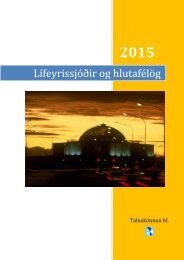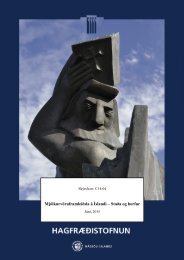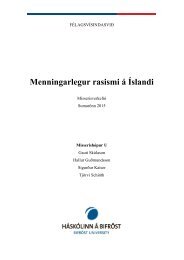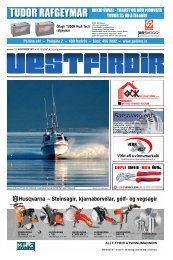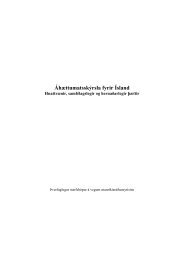Create successful ePaper yourself
Turn your PDF publications into a flip-book with our unique Google optimized e-Paper software.
WORLD REPORT 2016<br />
HUMAN RIGHTS WATCH<br />
In September, thousands of migrants and asylum seekers were stuck at various<br />
borders with inadequate shelter, unable to proceed with their journeys but with<br />
no genuine alternative, and at times dispersed by tear gas and water cannons.<br />
Hungary effectively closed its border with Serbia to asylum seekers and migrants<br />
in September, and with Croatia in October. Slovenia and Croatia at times<br />
blocked access for asylum seekers and migrants in September and October. In<br />
late November, Slovenia, Croatia, Serbia and Macedonia imposed border restrictions<br />
for asylum seekers and migrants, allowing only certain nationalities, including<br />
Syrians, to enter.<br />
EU governments worked fitfully over the course of the year to implement a set of<br />
proposals on migration and asylum policy that the European Commission made<br />
in May. An EU-wide refugee resettlement scheme was established, with countries<br />
pledging over 22,000 places over the next two years. Following a fractious<br />
debate and over the objections of Hungary, Czech Republic, Slovakia, and Romania,<br />
EU governments agreed to a program to relocate over the next two years a<br />
total of 160,000 asylum seekers who had landed in Italy, Greece, and potentially<br />
other countries experiencing significant arrivals. The United Kingdom opted out.<br />
At time of writing, only 159 asylum seekers had been relocated from Italy and<br />
Greece to other EU member states under the scheme.<br />
The majority of the commission’s proposals focused on measures to limit arrivals,<br />
strengthen border controls, and accelerate returns of people not granted<br />
the right to remain in the EU. The EU took some positive action, including<br />
pledges of increased aid to countries hosting large refugee populations and to<br />
humanitarian assistance organizations. Yet efforts to intensify immigration cooperation<br />
with origin and transit countries raised concerns about enabling rights<br />
abuses and denying people effective protection. Combating smuggling networks<br />
remained central to the EU approach, with a naval mission in the Mediterranean<br />
poised, beginning in October, to board, seize, and divert vessels used by smugglers.<br />
The full package of recast directives making up the Common European Asylum<br />
System entered into force in July, imposing revised common standards and rules<br />
with respect to procedures and reception conditions. Asylum seekers continued<br />
to face a protection lottery, with wide disparity among EU member states in<br />
recognition rates, accommodation, and integration measures. The European<br />
Commission stepped up its own enforcement, opening 74 infringement proceedings<br />
against 23 member states for failure to abide by EU asylum laws.<br />
Discrimination and Intolerance<br />
Attacks by armed extremists in Paris in January left 20 people dead—12 staff<br />
members of the satirical weekly Charlie Hebdo, four people taken hostage in a<br />
kosher supermarket, a police officer, and three attackers. In Copenhagen in February,<br />
attacks on a free speech debate and a synagogue left three people dead,<br />
including the attacker. The attacks underscored the serious problem of anti-<br />
Semitism in the EU. An October report by the EU Agency for Fundamental Rights<br />
showed that many EU governments fail to collect adequate data on hate crimes<br />
against Jews, a finding that reflects a wider failure to collect disaggregated hate<br />
crimes data.<br />
Hate crimes against Muslims are also a serious problem, with spikes in incidents<br />
reported in France and the UK. The acceptability of intolerance against Muslims<br />
was demonstrated in September when several EU leaders said they only wanted<br />
Christian, as opposed to Muslim, refugees in their countries.<br />
In September, the UN high commissioner for human rights, Zeid Ra’ad Al Hussein,<br />
criticized ongoing forced evictions of Roma and Travellers in several European<br />
countries in recent years. He highlighted France’s “systematic national<br />
policy to forcibly evict the Roma” and urged Bulgaria to halt forced evictions,<br />
“which are devastating to the affected communities.”<br />
By enacting the Gender Recognition Bill in July, Ireland became the fifth country<br />
in the world to offer legal recognition to the gender of people’s choice, excluding<br />
children under the age of 16. Ireland brought into effect a law permitting samesex<br />
marriage in November following a successful constitutional referendum guaranteeing<br />
marriage equality in May.<br />
Following its review of the EU, in September the UN Committee on the Rights of<br />
Persons with Disabilities (CRPD) raised concerns about children with disabilities<br />
living in institutions in EU countries who have no access to mainstream inclusive<br />
education. The committee also expressed concern about the negative effects of<br />
austerity measures on services for families with children with disabilities. The<br />
committee also noted concerns about the detention of refugees and migrants<br />
246<br />
247





